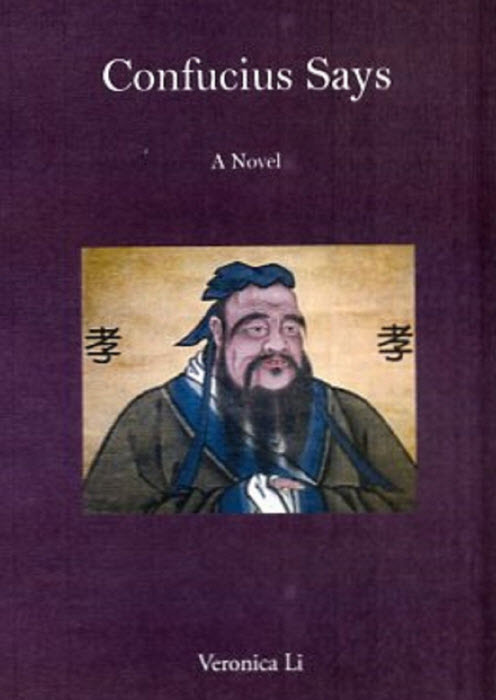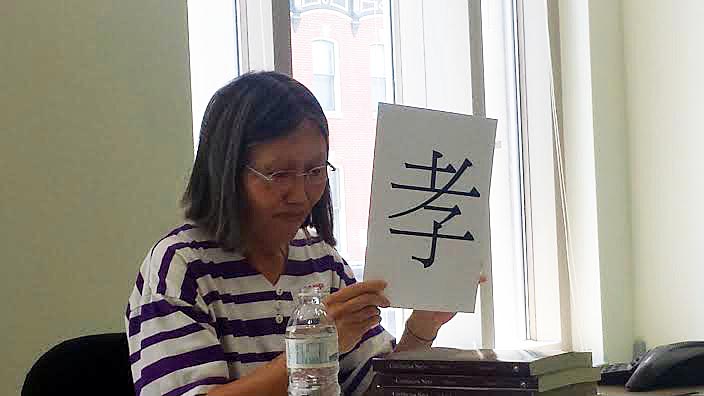30 Jul Veronica Li’s “Confucius Says” will resonate with Asian American families
 “Confucius Says” is an engaging novel about Cary, a Chinese American woman who takes in her aging parents largely because of the ancient cultural values and traditions expressed by Confucius, about filial piety and respect for elders.
“Confucius Says” is an engaging novel about Cary, a Chinese American woman who takes in her aging parents largely because of the ancient cultural values and traditions expressed by Confucius, about filial piety and respect for elders.
She has siblings who live far from northern Virginia where she lives, so she becomes the primary caregiver as the novel follows her parents’ slow deterioration and her Caucasian husband’s (and dog’s) struggle to accept this role she has taken on.
Asian Americans will recognize much of their own lives and family dynamics in this serious but often quite funny, and always thought-provoking story.
Veronica Li, the author, recognizes herself, and her parents, who moved in with her.
“It’s completely based on my experience with my parents,” she says. “The reason I did not write it as a memoir, all memoirs written by caregivers is written purely from their point of view.”
In fact, the first draft of the book was written as a memoir.
“When I was writing it I was so depressed,” she admits. “Aging is not fun, as we all know. There were episodes at the ER, the ICU, one after the other.”
She finally realized she could free herself from her personal perspective and have the freedom to tell the same story within a larger, more expressive narrative. So she fictionalized the characters and changed situations to suit the overall wisdom she was trying to share about her experiences.
“It was a very important part of this equation,” she says. “I wanted to have my parents have their say. This was for a selfish reason: Today I’m the caregiver. Tomorrow, I will be the care receiver. So I decided to make this a novel. (Now I’m) telling the story from the omniscient viewpoint of the narrator. I can get into each person’s head and tell each of their point of view.”
 Even the dog is real, but given a fictional doggy makeover. “My dog was Snoopy, a real Snoopy with all the characteristics of Snoopy,” she says but she changed it because readers’ familiarity with Peanuts character might distract from her story.
Even the dog is real, but given a fictional doggy makeover. “My dog was Snoopy, a real Snoopy with all the characteristics of Snoopy,” she says but she changed it because readers’ familiarity with Peanuts character might distract from her story.
When Li first took in her parents, they seemed close to dying. “That’s why I took them in,” she explains. “But the fact is once they were well taken care of, they bounced back up and they lived for 10 years.” In the course of the fictionalized story of her parents’ time with her they descend into dementia, and spend time in the ER. Finally they are institutionalized.
Dealing with her parents’ crises was a challenge for Li. “We are known to be good to parents. An American friend said ‘Oh, you’re so Chinese,’ but they have no idea that we have the same difficulties as everybody else, the same fights and same ups and downs. It’s as difficult for us as it is for anyone.”
The constant thread throughout the book is Cary’s (Li’s) relationship with her parents and how Asian family values run deep in their cultural DNA. Any Asian American and many non-Asians will be familiar with the tools of the parent-child give-and-take: Shame, guilt, fear, obligation, comparison to siblings, nostalgia and oh yes, love even though it may not be expressed in the hugs-and-kisses way that non-Asian Americans kids are raised.
Along the way, we read about the parents’ past, and the drama of their lives. “I heard these stories (about her mother’s life) as family anecdotes, but when I sat down to write about them I realized they were full of turmoil. They never fought in front of the children,” Li explains.

Veronica Li visited AARP headquarters in Washington D.C. on July 30 for a reading and booksigning.
“I thought people could learn from this story,” she adds. “In general, caregiving is a problem for everyone. But I think the burden is heavier for people of Asian heritage because of our cultural traditions. I agonized over it. This agonizing is not necessary if you understand about filial piety.”
The key, Li says, is also the lesson that the character Cary learns by the end of the book. “It’s not about making your parents happy at your own expense. It’s about making yourself happy too. And it’s also about serving your community and your country.
“It’s something much bigger, a moral code to good living in society. Because there’s so much guilt that comes with filial piety and because of everything they did for us, we cannot do enough for our parents. But that agony on my part was totally unnecessary.”
In the end, “taking care of your parents is good for your soul. We all have this need to give back. Even my non-Asian friends feel this guilt, this feeling of regret, if they think they didn’t give back. We all have this moral code written in us.
“It really is good for your soul – you just have to do it wisely, and take care of yourself while you do it. The universal thing is that we can never repay our parents exactly what they gave us.”
You can order “Confucius Says” from Amazon.com or VeronicaLi.com
It’s also available as a Kindle book.
This post was originally written for AARP and published on AARP’s AAPI Community Facebook page. If you want to see more profiles similar to this, be sure to “LIKE” the AARP AAPI Facebook page!




